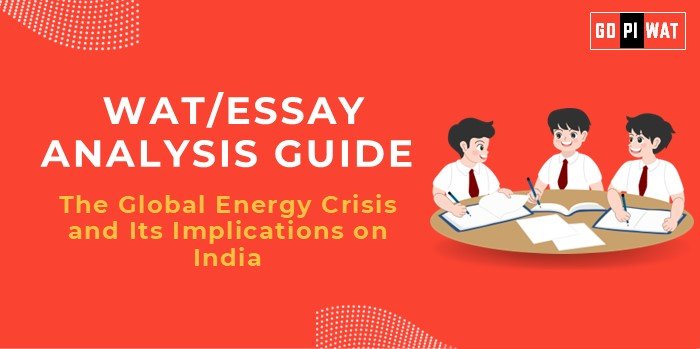⚡ The Global Energy Crisis and Its Implications on India
The global energy crisis impacts every aspect of India’s economic structure, from industrial growth to environmental sustainability. Given India’s heavy reliance on fossil fuels and its growing demand for energy, the crisis emphasizes the importance of renewable energy solutions and effective policy to ensure sustainable development.
📝 Effective Planning and Writing
- ⏳ Time Allocation:
- Plan: 5 minutes
- Write: 20 minutes
- Review: 5 minutes
- 📖 Preparation Tips:
- Note key facts on India’s coal reliance, subsidy structures, and renewable energy targets.
- Develop a balanced perspective on fossil fuels vs. renewables.
💡 Introduction Techniques for Essays
- 🎭 Contrast Approach: “India, the third-largest energy consumer globally, faces a paradox: high renewable energy ambitions but an equally high dependency on coal.”
- 🔧 Solution-Focused Start: “To address the energy crisis, India must harmonize its short-term fossil fuel dependency with long-term sustainability goals.”
🔍 Structuring the Essay Body
🏆 Achievements:
- 🌞 Substantial growth in solar and wind capacity under initiatives like the International Solar Alliance (ISA).
- 📜 Policy advancements, including the National Action Plan on Climate Change (NAPCC).
- 🌐 Significant strides in rural electrification, achieving near-universal access.
⚠️ Challenges with Comparative Analysis:
- 🛢️ Heavy dependence on coal for 55% of electricity generation.
- 🌍 Import reliance for oil and gas, exposing India to global price volatility.
- 📊 Comparatively slower energy diversification compared to nations like Germany and China.
🚀 Future Outlook:
- 🌱 Incremental and balanced transitions to renewables to meet India’s 2030 and 2050 sustainability goals.
- 🔋 Modernizing energy infrastructure, including grid improvements and energy storage solutions.
- 🤝 Expanding global collaborations for technology sharing and resource optimization.
📑 Concluding Effectively
- ⚖️ Balanced Conclusion: “India’s path to energy security lies in a balanced approach that combines renewable investment with efficient use of existing resources.”
- 🌎 Global Comparison Conclusion: “The energy crisis offers a wake-up call for India to draw insights from global leaders in energy diversification while addressing its unique energy needs.”
📊 Analyzing Successes and Shortcomings
✅ Key Achievements:
- 🌞 Rapid expansion in solar and wind energy capacities.
- 💡 Government-led energy efficiency programs, such as UJALA and PAT (Perform, Achieve, Trade).
- 🔌 Increased rural electrification rates, enhancing access across India.
❌ Ongoing Challenges:
- 🛢️ Over-reliance on coal, which contributes significantly to emissions.
- 💸 Financial strain from energy subsidies, limiting investments in renewables.
- 🔋 Infrastructure gaps in managing renewable energy efficiently.
🌏 Global Context:
India’s energy policies, though ambitious, face unique challenges compared to energy giants like China and Germany, which have made significant progress in reducing fossil fuel reliance.
🌟 Recommendations for Sustainable Progress
- 🌱 Focus on Renewables: Accelerate investments in solar and wind energy to reduce dependency on coal.
- ⚖️ Policy Enhancements: Reform energy subsidies to promote renewable energy and phase out fossil fuel incentives.
- 🔋 Infrastructure Development: Modernize the grid and implement advanced storage solutions for renewable energy management.
✍️ Sample Short Essays on the Global Energy Crisis and Its Implications for India
- ⚖️ Balanced Perspective: “India’s energy crisis reflects the dual challenge of sustaining economic growth while meeting environmental goals. Investment in renewables and policy reforms can address both issues, providing a stable path toward energy security.”
- 🔧 Solution-Oriented: “As India’s energy demand rises, balancing coal dependency with renewable investments is vital. Accelerating solar and wind projects can ensure a sustainable future without compromising energy needs.”
- 🌏 Global Comparison: “India can learn from Germany’s success in reducing coal usage. By focusing on efficient energy infrastructure, India can achieve similar progress while meeting growing energy demands sustainably.”


